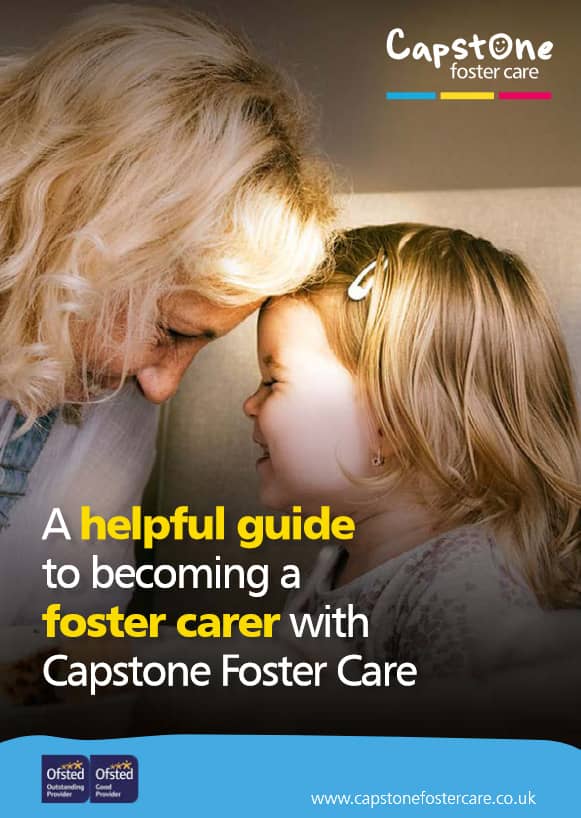


Fostering a disabled child
The role of an independent fostering agency
How to choose a foster care agency
Can I choose who I foster?
What are the benefits of fostering with an independent fostering agency?
What happens when a child is taken into care?
Fostering process: what happens on an initial home visit?
Fostering with local authority vs independent agency
A complete guide to becoming a foster carer
How Are Children in Foster Care Matched with Carers?
Foster Care Budgeting Tips
Becoming A Foster Carer
What is a Care Leaver?
What is a Foster Carer?
Fostering Regulations
How long does it take to become a Foster Carer?
What are the Foster Care requirements?
Changing IFA - Transferring to Capstone
8 reasons why a child may be taken into care
Fostering as a Career
Can you foster if you smoke or vape?
A guide to fostering assessments
LGBTQ+ Fostering
Equality, Inclusion & Anti-discriminatory Practice in Foster Care
What can disqualify you from foster care?
Can you foster if you’re on benefits?
Top transferable job skills to become a foster carer
Fostering as a same sex couple
Fostering while renting
Can you foster if you have mental health issues?
Is there an age limit for fostering in the UK?
Do foster carers get a pension?
How to foster a child: A step by step guide
How do DBS Checks Work?
Can I foster if...?
Mythbusting the top 10 Foster Care Myths
Can I foster if I am disabled?
LGBT Fostering Mythbusting
Can I foster if I have pets?
Can I Foster A Child?
Can I Foster and Work?
Can you Foster with a Criminal Record
Can Single People Foster?
LGBT Family and Foster Care
Fostering across Cultures
Muslim Fostering
Christian Foster Care
Sikh Fostering
Empty Nest Syndrome and Foster Care
Can I Foster?
What is the difference between residential care and foster care?
Fostering Babies and Young Children
What is Kinship Care?
Fostering Babies - Myths
Focusing on Parent & Child Fostering
Fostering Siblings
Fostering Teenagers
Fostering Teenagers - Breaking down the Myths
Fostering Unaccompanied and Asylum Seeking Children
Mother and Baby Foster Placements
Private Fostering
How does therapeutic fostering work?
Young Children Fostering Placements
Difference between short and long-term fostering
Types of self-harm
A Guide to the Foster Care Handbook
Reunification and Birth Parents: A Guide for Foster Carers
What is an EHC Plan? A Guide for Foster Carers
How to prepare a child for becoming a care leaver
Children who foster: impact of fostering on birth children
Fostering LGBTQ+ Youth
How to prepare your home for a foster child
How to help a lonely child: A Guide for Foster Carers
What are the National Minimum Standards for Fostering Services?
10 tips for foster children's education
How to prepare your foster child for secondary school
Tips for coping when foster placements end
Tips for foster parents during Coronavirus
What happens if foster parents get divorced?
5 ways to manage Mother's Day with foster children
Tips for managing foster children's bedtime routines
How to handle foster child bullying
Fostering allowances and the gender pay gap
What discounts can foster carers get?
How to adopt from Foster Care
5 ways to manage Father's Day for children in foster care
8 most common fostering challenges
FosterTalk Membership with Capstone Foster Care
Supporting foster children's contact with birth families
A guide to independent fostering
Keeping Children Safe Online: A Guide For Foster Carers
Movies About Foster Care
Play-based learning strategies for foster carers
A Guide to the Staying Put Program
Why Foster Parent Wellbeing Matters
How to deal with empty nest syndrome
How to recognise signs of depression in foster children
Can you take a foster child on holiday?
Tips and advice on fostering with a disability
10 tips on connecting with your Foster Child
Fostering vs Adoption - What's the difference?
How Fostering can change a future
How to adopt from Foster Care
How to encourage children to read in Foster Care
How to prepare a Foster Child's bedroom
Reading and Storytelling with Babies and Young Children
Supporting Children's Learning
The 20 most recommended books Foster Carers and young people should read
Things you can do when your children leave home
The impact of early childhood traumas on adolescence and adulthood
Anxious Disorders in Foster Children
What is sexual abuse and sexual violence
Foster Child behaviour management strategies
Foster Parent Advice: What to expect in your first year of fostering
Capstone's twelve tips at Christmas
10 celebrities who grew up in Foster Care
Could Millenials be the solution to the Foster Care crisis?
Do you work in Emergency Services?
Form F Assessor and Assessment Training
Foster Care Fortnight
Improving Children's Welfare - Celebrating Universal Children's Day
New Year - New Career - Become a Foster Carer
Young People Charities
A care leaver is a young person aged 16-25 years old who has been looked after by a foster carer for a given period since they were 14 years old or were in care on or after their 16th birthday. In the UK, once a child in care turns 18, they are no longer required to live in foster care and therefore become a care leaver.
Whilst the official leaving age in the UK is 18, children can leave care as early as 16 years old. But regardless of their age, all carer leavers are entitled to receive support from their local council. Care-experienced young adults may also be entitled to care leaver support if they were placed with a friend or relative under a Special Guardianship Order.
Leaving home and entering adulthood is daunting enough for any young person. But for young people who have been in foster care, there can be extra stress and pressure when compared to their non-fostered peers. With around 10,000 care leavers in the UK each year, our team at Capstone Foster Care work closely with care leavers, carers and local authorities to ensure a seamless transition out of care, whilst empowering our young people to embrace their independence.
Each young person leaving care is entitled to the following support:
Young people in care will receive their Pathway Plan when they are 16, so they can begin planning for the future. A personal advisor will also be assigned to the care leaver to support them with developing and executing their Pathway Plan. This plan includes details on higher education, employment, health, finances and contact with family. Each plan is unique and designed to reflect the young person’s wishes and aspirations, and is reviewed at least once every six months to ensure it's updated regularly and the care leaver is receiving sufficient support.
Advisors must attend Plan Pathway reviews until the care leaver is 21. However, many young adults extend this service until they reach the age of 25.
Care leavers can also receive financial support in the form of:
Care leavers are also encouraged to discuss their eligibility for grants and charities with their advisors.
The Capstone Care Leavers Trust offers financial funding, educational support and job opportunities for young people. Our Trust status is something we're incredibly proud of and we work hard to invest in our children and young people throughout every phase of their fostering journey.
The 'Staying Put' program has been designed to help children who would benefit from an extended stay with their foster family. The choice to stay put can be due to financial instability, vulnerability, delayed maturity or time to finish their education. However, it;s important to note that after 18, the young person is no longer considered a child in care, despite remaining with their foster family.
Care leavers are also entitled to various bursaries and grants from the government - these are available for those who wish to go into higher education or an apprenticeship scheme. For care leavers pursuing an apprenticeship, they are eligible for a £1000 bursary, paid by the Education and Skills Funding Agency (ESFA).
If a care leaver wishes to go to university, they are also entitled to various payment schemes known as Care and Foyer Leavers Funding. These schemes offer bursaries of up to £9000 each year. However, the amount of funding a care leaver might receive is dependent on the type of funding their UCAS choices provide.
The Care Leavers Association is a charity-led organisation designed to enrich the lives of young people leaving care. With a huge network and wealth of resources available, they actively support care leavers whilst striving to continually improve the care system.
To learn more about care leavers and the support available to them, contact our team at Capstone Foster Care or visit the Capstone Care Leavers Trust website for further information.
If you’ve got any questions or would like to find out more about fostering with Capstone, fill out the form below.
An experienced fostering advisor from your local area will then be in touch.

Start the conversation today. Our team of friendly advisors are on hand to answer any foster care questions you may have. We can offer you honest and practical advice that can help you decide if becoming a foster carer is the right path for you.


